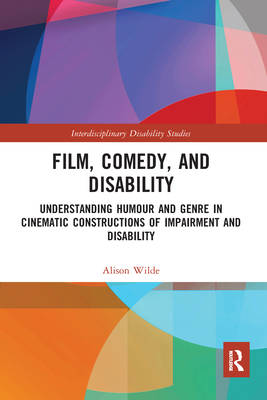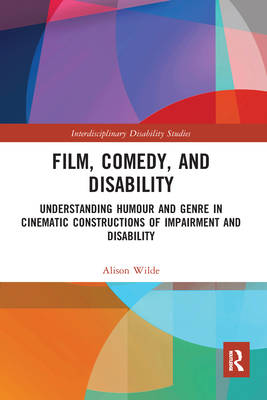
- Afhalen na 1 uur in een winkel met voorraad
- Gratis thuislevering in België vanaf € 30
- Ruim aanbod met 7 miljoen producten
- Afhalen na 1 uur in een winkel met voorraad
- Gratis thuislevering in België vanaf € 30
- Ruim aanbod met 7 miljoen producten
Film, Comedy, and Disability
Understanding Humour and Genre in Cinematic Constructions of Impairment and Disability
Alison WildeOmschrijving
Comedy and humour have frequently played a key role in disabled people's lives, for better or for worse. Comedy has also played a crucial part in constructing cultural representations of disability and impairments, contributing to the formation and maintenance of cultural attitudes towards disabled people, and potentially shaping disabled people's images of themselves. As a complex and often polysemic form of communication, there is a need for greater understanding of the way we make meanings from comedy.
This is the first book which explores the specific role of comedic film genres in representations of disability and impairment. Wilde argues that there is a need to explore different ways to synthesise Critical/Disability Studies with Film Studies approaches, and that a better understanding of genre conventions is necessary if we are to understand the conditions of possibility for new representational forms and challenges to ableism.
After a discussion of the possibilities of a 'fusion' between Disability Studies and Film Studies, and a consideration of the relationships of comedy to disability, Wilde undertakes analysis of contemporary films from the romantic comedy, satire, and gross-out genres. Analysis is focused upon the place of disabled and non-disabled people in particular films, considering visual, audio, and narrative dimensions of representation and the ways they might shape the expectations of film audiences.
This book is of particular value to those in Film and Media Studies, and Critical/Disability Studies, especially for those who are investigating more inclusive practices in cultural representation.
Specificaties
Betrokkenen
- Auteur(s):
- Uitgeverij:
Inhoud
- Aantal bladzijden:
- 196
- Taal:
- Engels
- Reeks:
Eigenschappen
- Productcode (EAN):
- 9780367587680
- Verschijningsdatum:
- 30/06/2020
- Uitvoering:
- Paperback
- Formaat:
- Trade paperback (VS)
- Afmetingen:
- 156 mm x 233 mm
- Gewicht:
- 379 g

Alleen bij Standaard Boekhandel
Beoordelingen
We publiceren alleen reviews die voldoen aan de voorwaarden voor reviews. Bekijk onze voorwaarden voor reviews.











